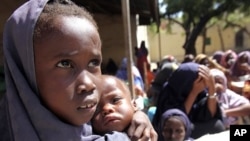The World Food Program strongly condemns the diversion of food from starving, vulnerable Somalis. WFP says it is investigating the allegations of theft of desperately needed humanitarian food and will suspend any parties found responsible.
WFP is currently feeding 1.5 million people in central and northern Somalia. The organization says it is confident the vast majority of humanitarian food is reaching starving people in the capital Mogadishu. WFP estimates that less than one percent of the food it distributes there has been looted.
While this may not seem to be a lot, WFP says even the smallest amount of food taken from starving and vulnerable Somalis can have serious consequences. Geneva director Lauren Landis notes Somalia is a particularly difficult and dangerous place to work in.
She says her agency has a very strong system of controls in place to make sure food goes to the people for whom it is intended. For example, Landis says WFP employs so-called third party monitors to make sure everything is operating as it should.
“So, these are organizations that we hire - they are not WFP employees - that we hire to go out and take a look at our programs," Landis explains, "and if they find anything, they come back and tell us and then we investigate it immediately. And, this is what has happened in this case. So, we are immediately investigating fully this allegation in this very difficult working environment.”
An Associated Press report identifies a contractor known as Enow as allegedly having been involved in the sale of WFP food. His wife heads a powerful Somali aid agency called Saacid that WFP uses to distribute hot food.
The World Food Program would not comment on these allegations, but says it will investigate all alleged incidents and suspend any parties found to be responsible. WFP says it could suspend distributions while the investigations take place, but says the suspension of life-saving food to millions of starving people is unthinkable.
Spokeswoman, Christiane Berthiaume, acknowledges the risks aid workers run in distributing aid in Somalia. But WFP has no choice, she says.
“The stakes are very high here. It is peoples’ lives here. It is a question of death or life. We need to continue," notes Berthiaume. "We need to investigate the situation. We condemn those that are doing that. But, we need to continue our work because if we do not, people are going to die. There is no choice. We have to continue, but to see and try to find and stop if this happened. I think it is outrageous that people do that.”
This is not the first time international food aid has been stolen in Somalia. In 1993, Delta Force Commandos and Army Rangers were dropped into Somalia to kidnap lead terrorist Mohammed Farrah Aidid, who had been killing U.N. workers delivering food to starving Somalis. The U.S. withdrew its forces after the mission failed and many American soldiers lost their lives.
The United Nations reports more than 3.2 million people or half of Somalia’s population is in need of food aid. More than 450,000 people live in famine zones in south-central Somalia controlled by the Islamist al-Shabab militant group. The United States estimates 29,000 children under-five have died from malnutrition-related causes.
The World Food Program says it is ready to increase food distributions to 3.7 million people if it can regain access to areas in the south of the country that currently are inaccessible.
WFP Outraged Food May Have Been Stolen from Starving Somalis
- By Lisa Schlein




